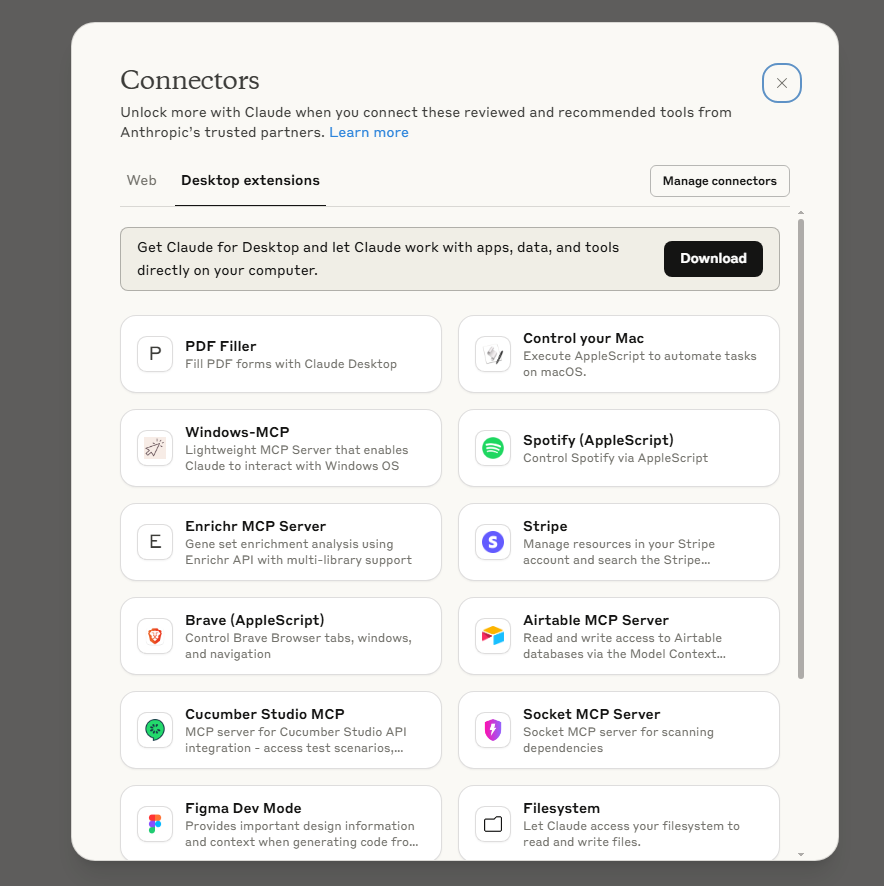Table of Contents
Overview
Claude’s innovative directory represents a significant advancement in AI-assistant technology, launched on July 14, 2025. This groundbreaking platform transforms Claude from a helpful assistant into an informed AI collaborator by enabling direct connections to essential productivity applications through the open-source Model Context Protocol (MCP). The directory provides one-click integrations with popular tools like Notion, Canva, Figma, Stripe, and many more, streamlining workflows and eliminating the need for manual data transfers between different applications.
Key Features
The Claude Directory is built around several core functionalities designed to enhance productivity and Claude’s capabilities.
- Tool Directory for Claude: A carefully curated collection of applications and services specifically built to integrate seamlessly with Claude through MCP.
- One-Click Integrations: Effortlessly connect compatible apps to Claude with a single click, eliminating complex setup processes for most remote services.
- Extensive App Support: Growing support for popular productivity tools including Notion, Canva, Figma, Stripe, Linear, Atlassian (Jira and Confluence), Zapier, GitHub, Google Drive, Slack, PostgreSQL, and many others.
- Workflow Visibility and Interaction: Claude gains contextual awareness of your projects, deadlines, and data, providing intelligent assistance directly within your connected tools.
- Secure Connections: All integrations are built with security in mind, featuring controlled permissions, encryption, and user-managed access controls.
How It Works
The Claude Directory operates through Anthropic’s Model Context Protocol (MCP), which was first introduced in November 2024. Users can explore available tools at claude.ai/directory or through the Claude Desktop app. Remote service connections require authentication through secure OAuth flows, while local desktop extensions can be installed directly through the Claude Desktop app. Once connected, Claude can access relevant data from your tools in real-time, enabling context-aware assistance without requiring users to repeatedly explain project details or deadlines.
Use Cases
The directory enables numerous productivity enhancements across different workflows:
- Automated Project Management in Notion: Claude can update project statuses, create documentation, generate reports from existing data, and organize information across databases.
- Design Collaboration in Figma: Share design files for analysis, receive feedback on user interface elements, or generate code from design specifications.
- Financial Analysis from Stripe: Access payment data, generate sales summaries, identify transaction trends, and create financial reports.
- Development Workflow Integration: Connect to GitHub repositories, Linear issue tracking, or other development tools for automated code reviews, documentation generation, and project management.
- Enhanced Research and Analysis: Combine information from multiple connected sources to provide comprehensive insights and data-driven recommendations.
Pros \& Cons
Advantages
- Seamless Integration Experience: True one-click connections for most supported applications with minimal technical setup required.
- Enhanced Contextual Intelligence: Transforms Claude from a general assistant into a specialized collaborator with deep knowledge of your specific projects and workflows.
- Standardized Protocol: Built on the open MCP standard, ensuring compatibility and future expandability across different AI systems.
- Growing Ecosystem: Continuously expanding library of supported applications and community-contributed connectors.
Disadvantages
- Limited to MCP-Compatible Tools: Functionality is restricted to applications that support the MCP protocol, though the ecosystem is rapidly expanding.
- Subscription Requirements: Remote service integrations require paid Claude plans (Pro, Max, Team, or Enterprise), while desktop extensions are available to all users.
- Learning Curve for Advanced Features: While basic connections are simple, maximizing the potential of integrated workflows may require familiarity with MCP concepts and configuration.
How Does It Compare?
Claude’s directory represents a unique approach compared to existing automation and integration solutions. Unlike Zapier, which excels at predefined workflow automation with over 7,000 app integrations but requires manual setup of trigger-action sequences, Claude’s directory enables dynamic, conversational interaction with your tools. While Zapier focuses on “when X happens, do Y” automation, Claude can intelligently decide which tools to use based on conversational context and user intent.
Compared to OpenAI’s Custom GPTs and plugins, Claude’s MCP-based approach offers several advantages: deeper integration capabilities, better security through controlled permissions, and the ability to work across multiple tools simultaneously within a single conversation. The MCP standard also ensures that integrations are not vendor-locked and can potentially work with other AI systems that adopt the protocol.
Make.com and n8n offer powerful automation capabilities but require technical setup and predefined workflows, while Claude’s directory provides more flexible, conversation-driven interactions that can adapt to changing user needs in real-time.
Final Thoughts
The Claude Directory represents a significant evolution in AI-assistant technology, moving beyond simple question-and-answer interactions toward true collaborative intelligence. By leveraging the open MCP standard, Anthropic has created a platform that not only enhances Claude’s capabilities but also contributes to the broader AI ecosystem. While the directory is still expanding its supported applications and refining user experience, its core promise of context-aware, multi-tool AI assistance offers compelling value for professionals seeking to streamline their digital workflows. As more applications adopt MCP support and the ecosystem matures, the directory has the potential to fundamentally change how we interact with AI assistants in professional environments.
https://claude.ai/directory